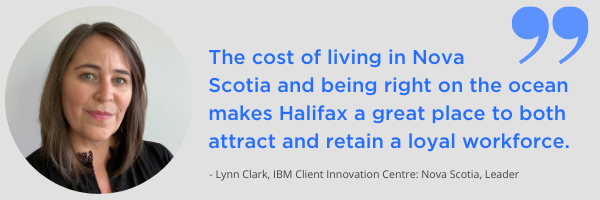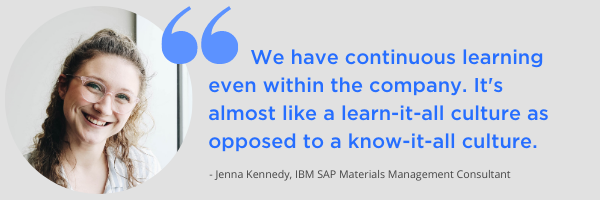Jenna Kennedy has been proudly wearing her iconic X-Ring for three years now, but the St. Francis Xavier University graduate knows that as an IBM employee, she’ll never stop learning.
Hired into the company’s early professional program, she started working at IBM as soon as she finished her Bachelor of Business Administration degree. As a specialist in the SAP practice, she works with new and existing clients to implement financial and logistical systems.
“I've worked with clients in the automotive industry, in the fashion industry, in the consumer products industry… It's always changing and there's different challenges every single day,” said Kennedy.
She appreciates that she has the opportunity to work with colleagues across Canada and internationally, while living in the hometown that she loves. Kennedy sees a lot of room for growth for her career in Halifax and appreciates the training opportunities available to her at IBM.
Why IBM Chose Halifax
When deciding where to build IBM’s first Canadian Client Innovation Centre, IBM Canada leader Lynn Clark explained that there were three key reasons why IBM chose the Halifax suburb of Bedford in 2013:
“Working with Halifax Partnership, the province of Nova Scotia, and with our academic partners across N.S. made it really easy to do business and grow here,” she said.
The second reason is skills and access to talent. “A large part of our strategy is hiring what we call associates. They’re fresh grads directly out of school; 50 per cent of our workforce comes from local or Nova Scotia school partners.”

“The third reason is the economics,” said Clark. “The cost of living in Nova Scotia and being right on the ocean makes Halifax a great place to both attract and retain a loyal workforce. Part of that is attracting people from other parts of Canada or newcomers to Canada to come and settle in Nova Scotia; it’s an incredible value proposition.”
“Our location in Bedford is a short commute for people,” explained Clark. “They’re definitely having more time in their day than people in larger centres who might have lengthy commutes. The local culture is a big draw.”
Growing Opportunities in Tech and Talent
More than ever, Halifax is getting recognized as one of the best places to work in Canada and the STEM talent pool in the city is growing at a rapid rate. In its recent Tech Talent report, CBRE named Halifax as one of its “Next 25” cities to watch, noting that the city’s talent labour force grew by 11 per cent over five years, for a total tech labour pool of 13,200.
Dalhousie University, the region’s largest university, awarded more than 1,900 degrees and diplomas in Mathematics, Computer Science, and Information Sciences last year - an 18 per cent increase over the same period the year before.
The IBM Client Innovation Centre in Bedford has grown from 65 employees to well over 700 in seven years, with most employees working remotely due to COVID-19. In the span of 12 hours last March, IBM moved from a seated environment with people working in the office to a work from home plan.
The company hires students with computing science degrees and diplomas from universities and technical programs at the Nova Scotia Community Colleges. But they also look far beyond those traditional programs.
“We’ll hire from business programs, most mathematics programs. We're really looking for people who are the right fit, to fit into our culture of learning,” said Clark.
“We hire so many associates, we’re looking for people that have the aptitude and the willingness to join the team and learn and grow their career with us.”
Fostering a Culture of Learning
IBM requires employees to complete at least 40 hours of training per year in its micro-credentialing program, and also encourages employees to take on additional training to foster career growth, such as learning new computer languages or upgrading knowledge of software or communication skills.
Kennedy says that she is thankful to have found an opportunity with IBM that has allowed her to grow. “It’s been an awesome experience for me,” she said, adding that she is now SAP certified, and has had an opportunity to go into communications training.
“Our president in Canada hosted a panel discussion, and one of the things that came out of that discussion were some like key recommendations that he's making to CEOs across the country, particularly around this concept of continuous learning,” said Clark.

How the Halifax Partnership Helps
“The support and the reach out that I've received from Halifax Partnership has been very meaningful to me in this role,” said Clark, who moved to her leadership role in January 2020.
“They create connections within the local business community and government. They are constantly reaching out to make connections with newcomers through the Connector Program.”
“I participated in a really fun event just prior to COVID called Hire Me Halifax,” said Lynn. “I was fortunate enough to participate on a judging panel for that and I can say that out of that event, we actually have hired some of those students who pitched in the event. That connection across multiple levels has really been invaluable to us.”